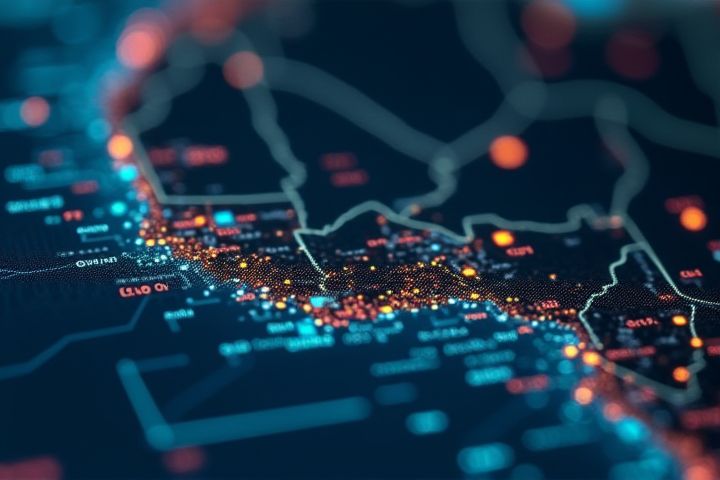
Internet usage in Nigeria has seen remarkable growth, with the number of active internet users exceeding 100 million as of 2023. This surge is largely driven by the increasing availability of affordable smartphones and mobile data plans, making connectivity more accessible to the general population. Social media platforms like Facebook, Twitter, and Instagram play a significant role in shaping communication and information sharing among Nigerians. The country's digital economy is burgeoning, with e-commerce and online services gaining traction; you can expect to see innovative solutions emerging from Nigerian startups. Despite challenges such as infrastructure and electricity supply, the potential for digital growth remains substantial, positioning Nigeria as a key player in the African tech landscape.
High mobile internet penetration
Nigeria boasts one of the highest mobile internet penetration rates in Africa, with over 80% of the population accessing the web through mobile devices. This surge in connectivity has facilitated a dynamic digital landscape, enabling growth in various sectors such as e-commerce, social media, and online banking. With major telecommunications companies investing in infrastructure, high-speed mobile networks like 4G and 5G are becoming increasingly available, further enhancing user experience. As a result, the nation's youth are particularly leveraging these advancements to innovate and drive economic change, making Nigeria a key player in the global digital economy.
Youth-dominated online demographic
Nigeria's internet usage is significantly driven by its youth population, with over 60% of users aged between 18 and 35. This demographic is increasingly engaging on various social media platforms, influencing trends, opinions, and consumer behaviors. With mobile technology access, many young Nigerians are utilizing online resources for education, entertainment, and entrepreneurial ventures. As digital literacy improves, the youth are poised to further transform the online landscape, emphasizing the importance of internet accessibility and digital skills development in the country.
Popularity of social media platforms
Nigeria has seen a remarkable surge in internet usage, with a significant emphasis on popular social media platforms like Facebook, Twitter, and Instagram. The rapid adoption of smartphones has facilitated easy access to these platforms, making them integral to communication and marketing strategies for businesses and individuals alike. This social media boom not only fosters connectivity among Nigerians but also plays a vital role in mobilizing youth engagement and activism. As you navigate this digital landscape, understanding the trends and influences of these platforms can enhance your online presence.
Growing e-commerce sector
The e-commerce sector in Nigeria has seen remarkable growth, driven by increasing internet penetration and smartphone usage among the population. With over 100 million internet users, the digital landscape offers vast opportunities for businesses to reach consumers efficiently. Popular platforms, such as Jumia and Konga, have played a significant role in shaping the online shopping experience, providing a diverse range of products and services. As a consumer in this evolving market, your purchasing options expand, enabling you to shop conveniently from the comfort of your home.
Significant digital payment adoption
In Nigeria, the surge in internet usage has significantly propelled the adoption of digital payment systems, transforming the financial landscape. Platforms such as mobile wallets, bank apps, and fintech solutions enable users to conduct transactions seamlessly, promoting financial inclusion among unbanked populations. As of 2023, reports indicate that over 60 million Nigerians actively engage in online financial services, demonstrating a strong preference for cashless transactions. This digital shift not only enhances convenience but also bolsters the economy by facilitating faster commerce and reducing overhead costs for businesses.
Expanding broadband infrastructure
Expanding broadband infrastructure in Nigeria is crucial for enhancing internet access and stimulating economic growth. With a rapidly growing population and increasing demand for digital services, investment in high-speed internet connections is essential. Improved broadband connectivity not only benefits businesses and entrepreneurs but also enhances education and healthcare services through telemedicine and online learning platforms. Your involvement in supporting local initiatives can foster the development of a robust digital ecosystem that empowers communities across the nation.
Local content and digital innovation
Internet usage in Nigeria is increasingly driven by a focus on local content, reflecting the country's rich cultural diversity and unique narratives. Digital innovation has surged, as entrepreneurs leverage technology to create solutions tailored to local challenges, such as mobile banking and e-commerce platforms. You will find that social media serves as a pivotal tool for connecting communities and promoting local businesses, enhancing consumer engagement. This dynamic landscape not only fosters economic growth but also empowers users by creating more accessible online experiences that resonate with their identities.
Cybersecurity challenges
Nigeria's rapid internet adoption has intensified vulnerabilities to cyber threats, making cybersecurity a critical concern. With over 100 million internet users, incidents of data breaches, phishing attacks, and ransomware have surged, calling for urgent action. Organizations are investing in advanced security measures and training to combat these threats, while the government implements regulatory frameworks to enhance digital safety. As a user, your awareness of these challenges can significantly contribute to a safer online environment.
Government internet regulations
Government internet regulations in Nigeria significantly impact online activities and user behavior. The Nigerian Communications Commission (NCC) enforces policies to enhance cybersecurity, protect consumer rights, and promote fair competition among service providers. Legislation such as the Cybercrime Act and the National Information Technology Development Agency (NITDA) guidelines shape the digital landscape by addressing issues like data privacy and online fraud. Understanding these regulations is crucial for users to navigate the internet safely and comply with local laws while engaging in online activities.
Digital literacy and education initiatives
In Nigeria, internet usage has significantly enhanced digital literacy, empowering individuals with essential skills for the modern workforce. Various educational initiatives, such as the Digital Nigeria Programme, aim to equip citizens with technology proficiency, fostering innovation and entrepreneurship. Through online platforms, students gain access to diverse learning resources, promoting lifelong learning and skill development. By improving connectivity, these efforts create opportunities for economic growth and social inclusion across the nation.
